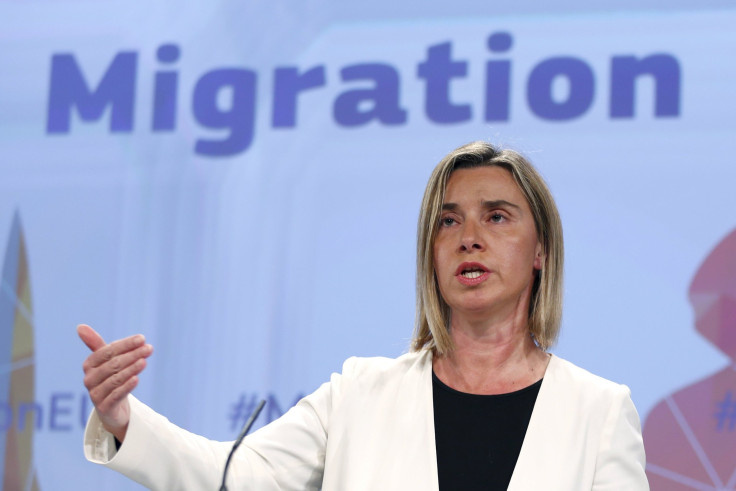Mediterranean Migrants Crisis: EU Approves Naval Mission To Intercept, Destroy Traffickers' Boats

In order to cope with the surge in the number of migrants attempting to cross the Mediterranean in recent months, the European Union (EU) on Monday approved a naval force to clamp down on people smugglers and traffickers. The EU hopes that the operation, which is expected to be launched next month, would prevent migrant deaths in the region, where over 1,800 people are believed to have died this year alone.
“I would say there is a clear sense of urgency also because we all know very well that June is the beginning of summer and in this operation seasons are important,” Federica Mogherini, the EU’s foreign policy chief, said at a press conference in Brussels. “As summer comes, more people are traveling so we want to have the operation in place as soon as possible, if it is to deter the traffickers’ and smugglers’ organizations.”
The naval mission, headquartered in Rome, would also allow the destruction of smugglers’ boats after their detection and inspection. However, authorization of the use of force would require further consent from European and African governments, and the United Nations Security Council. Once these approvals are in place, EU vessels would have the authority to intercept ships suspected of illegally harboring migrants and search, seize or even destroy them in Libyan territory or international waters.
“It is not so much the destruction of the boats but the destruction of the business models of the (smugglers') networks themselves,” Mogherini reportedly said, adding that cooperation with the strife-torn nation of Libya, which not only serves as the gateway to Europe for African migrants but also contributes a significant chunk of these migrants, is essential for the operation to succeed.
“We are looking for a partnership -- there is a responsibility the Libyans themselves have to take on their territory, for the land and sea borders,” Mogherini added. However, cooperation with Libyan authorities is easier said than done, given that in addition to the internationally recognized government at Tobruk, feuding factions control different regions of the country such as Tripoli and Misrata.
Critics have also raised doubts over the use of military force in the region, which is arguably one of the most dangerous migrant routes in the world.
“It’s not clear to me that the ministers understand the complexities of migration dynamics involved,” Elizabeth Collett, director of the Migration Policy Institute Europe, a Brussels-based research institute, reportedly said. “Military operations in the Mediterranean are only really likely to have any impact as one very small piece in a far more comprehensive strategy to address smuggling.”
© Copyright IBTimes 2024. All rights reserved.






















